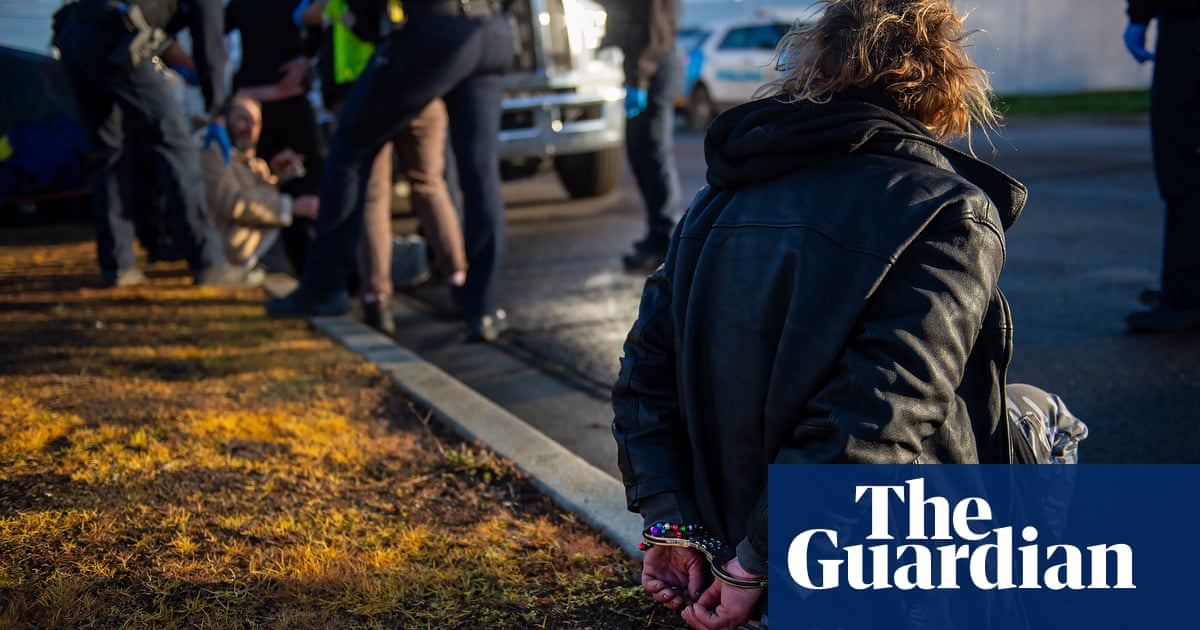In September, Oregon lawmakers enacted legislation turning low-level drug possession into a more serious crime punishable by up to 180 days in jail. The resulting crackdown has led to thousands of arrests statewide in recent months. People targeted in cities such as Medford, and overworked public defenders tasked with representing them, say the drug enforcement has been chaotic and at times brutal.
While the new policy has appeared to reduce visible drug use in some public spaces, unhoused people, who have been most impacted by the police response, say it has exacerbated their struggles.
…
The Medford police department has led the state in drug criminalization – by a lot.
The city is located in a region near the California border that is one of the more conservative areas of a blue state; more than half of voters in Jackson county, which includes Medford, supported Donald Trump.
From September, when the new law was enacted, through 26 March, the Medford police force carried out 902 drug possession arrests – more than double the number of cases in Portland (a city with seven times the population). Jackson county has logged 1,170 arrests total.
Verling, an officer on the city’s “livability” team, a unit focused on low-level crimes, including unlawful camping, trespassing, public drinking and drug possession, said many police were relieved when drugs were recriminalized. The 2020 reform had led to increasing reports of drug use on the streets and growing concern about public intoxication.
Recriminalization, Verling said, allows him to engage people in hopes of pushing them to treatment. “I really don’t want to see someone go to prison … but this gives us the ability to get back into their lives,” he said on a recent patrol through Medford.
He said the job was most rewarding when seeing someone turn their life around after they’ve been jailed – and when his team arrests dealers, potentially “making people sober by making the drugs inaccessible”.
One of the livability team’s main priorities has been clearing homeless encampments, and as Verling drove his patrol car onto a pedestrian greenway, the impact was clear. During the pandemic, encampments were a common site. Now, there were few visible signs of homelessness. Several locals were jogging.
Where did people go?
“People leave town. They’re like, ‘OK well it’s a crime to camp here,’” he said, adding he believed many were in shelters.
…
Jackson county designed its program so officers could directly hand over arrestees to drug treatment programs instead of jail, a collaborative approach meant to get people immediate help without involving the courts. But many don’t qualify, aren’t offered this alternative during their arrest, or they decline an officer’s offer. According to the latest available data, while there have been nearly 1,200 possession arrests, as of 27 March, only 69 people have been referred to deflection.
Instead, many get arrested. And rearrested. One 43-year-old unhoused woman said police were “acting like every person on the street is a drug addict, which is not true”, and that she had been arrested four times by Medford’s livability team since October, generally for camping violations. While she was quickly released after her last arrest, her partner was not, leaving her to camp outside alone. The woman, who asked not to use her name out of fear of police retaliation, said she was sleeping in front of a social services center in hopes her partner could easily find her when he gets out. “The separation makes me feel like I can’t breathe,” she added. “Police say they’re helping the homeless, but they’re just throwing us in handcuffs and jail.”



A wiser person might concede that if an unhoused addict had $100 in spare change they might also be able to afford treatment, housing and food.
$100 isn’t going to get anyone treatment or housing, and they’d rather blow it in a drug market than on food.
https://www.kgw.com/article/news/crime/federal-agents-bust-gresham-drug-market/283-bf97509c-2605-4b56-a095-3274c6d19664
How many addicts or former addicts do you know 'cause that’s a pretty big brush you’re using to paint ALL addicts with.
I used to be an addict (booze) and came close a couple of times to a full-blown cocaine addiction (the 80’s and early 90’s were crazy).
If you can’t feel any empathy or compassion for those battling an addiction you are missing out on an important part of being human and caring for your neighbor … whoever they may be.
Well, I know how much treatment and housing costs and it’s way more than a $100.
I also know if you give an addict a choice between food and feeding the addiction they will choose the addiction every day and twice on Sunday. (That’s why it’s “an addiction”.)
Yet you seem to be assuming that ALL addicts are non-functional in society. The 80’s Wall St should have taught you that’s not true.
80’s Wall Street isn’t living in their own shit on the streets of Portland.
Exactly. Many addicts are socially functioning … working jobs, having and caring for families, yet still addicts.
Your brush strokes fail to take them into account.
This guy isn’t interested in actual discourse. He only seems capable of one-liner nonsense and hoping you just accept it because it “feels right”.
They also aren’t the ones getting evicted and arrested because they are otherwise unable to function.
Look, it’s super simple, come on out to Portland and I’ll take you on a tour. Foster, Powell, Marine Drive, Glisan, NE 33rd, SE Steele Street behind Reed College (where my cousin’s stolen car was found full of garbage, fentanyl foil, and needles).
Then you can tell me all about how they aren’t hurting anybody.
A local news station went up to talk to the campers on Marine Drive, while they were out interviewing people, their van got robbed.
If you don’t believe me, that’s fine, believe the people who are out there:
https://wpde.com/news/nation-world/tweet-about-homelessness-in-portland-goes-viral-video-its-a-piece-of-cake-loving-us-to-death-twitter-houselessness-homeless-old-town-crisis-oregon-support-services
(please note: the source of this story, Kevin Dahlgren, may also be a piece of shit, but Wendy’s story is worth reading).